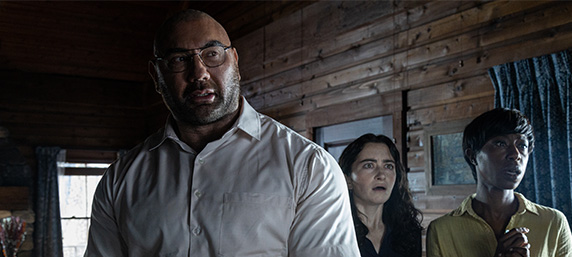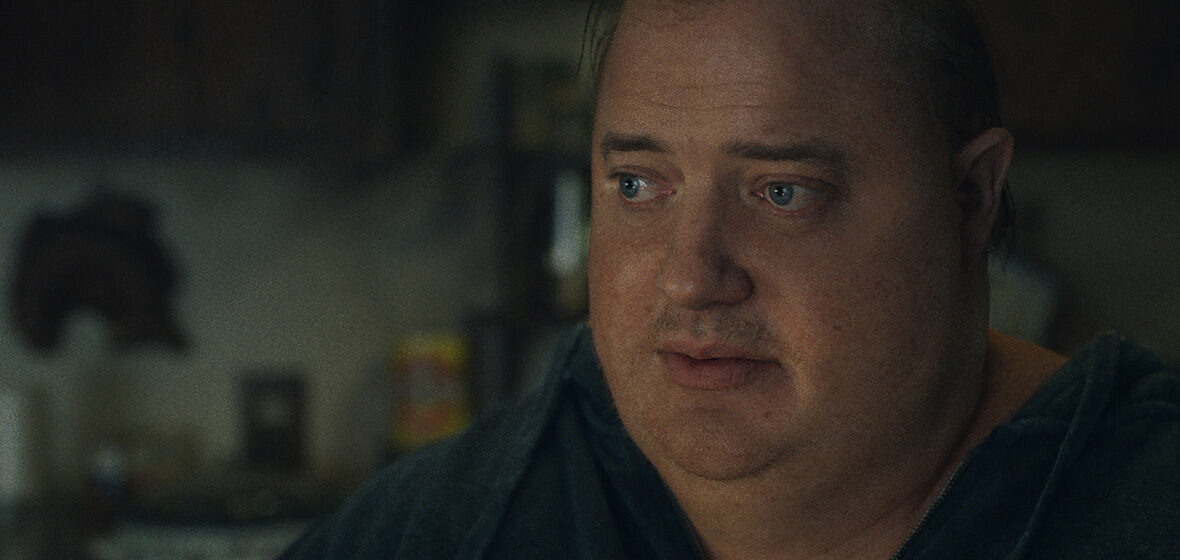The Whale
The Whale sounds like a cruel joke. It’s a film about a morbidly obese recluse who eats himself to death, and that’s the title the film was given? Oh, but wait, the term is actually a reference to Melville’s Moby Dick. Our protagonist is a creative writing teacher with a heart condition, and every time he has a heart attack, the only thing that can calm him down is reading a student paper on the novel; this paper functions as an obvious device for listing the film’s themes. So the film is titled ‘Whale’ not because of the protagonist’s condition, but because it focuses on one person’s interpretation of Melville. This is the ‘progressive’ excuse writer Samuel D. Hunter appears to make for his choice of title.
The professor is called Charlie (Brendan Fraser), and he is so embarrassed about his condition that he gives classes online only, with the camera turned off; he excuses this as being due to an unresolved technical issue. Charlie lives alone and doesn’t interact with anyone besides his carer and friend, Liz (Hong Chau), who urges him to go to hospital or he will risk dying of congestive heart failure.
Charlie is willing to embrace his end, though. He refuses to go to the hospital, doesn’t curb his eating, and decides to attempt reconnecting with his estranged teenage daughter Ellie (Sadie Sink). There’s also a mysterious youth from a religious cult who is invested in helping Charlie – or, rather, in saving his soul.
Ellie is the prototype of an angry and depressed teenager. Her coping mechanism is to call out insults rather than speaking normally. She reluctantly agrees to spend the days with Charlie on the condition that he’ll pay for her time and help her write an essay for school. She’s also implausibly mean, with that “teenagers are cruel” shtick that so often pops up in lazy writing. It only heightens Charlie’s love when Ellie commits vicious acts of malice towards him; he’s capable only of seeing the good in her.
But I get it. She feels abandoned. Charlie left his family when she was still an infant for one of his students, a man named Alan, who tragically died in an incident that probably triggered Charlie’s descent into depression and, consequently, obesity. Ellie’s mother, Mary (Samantha Morton), isn’t the best role model. Everyone is dealing with trauma in their own destructive way, but this idea has no legs in the film. The film highlights relevant issues such as that trauma is intergenerational and harmful to both the person who suffers trauma, and others around that person. However, it also appears to support the idea that it just takes one person to break the chain, and then everything relating to the trauma will be resolved. Well, that’s where the film loses me.
Hunter has adapted his own play, and Darren Aronofsky has directed it. For better or for worse, they’re a match made in heaven. Aronofsky is a terrific technical director, but his writing style can be patronising. Hunter’s lines have little compassion or humanity, and Aronofsky can’t help but indulge in showing how grotesque Charlie is. He films him succumbing to a drawer full of candy with the same manipulative bluntness as in a reality show. The scene is icky, disconnected from the rest of the film, and would have been a disaster if it weren’t for one person – Brendan Fraser.
Fraser embodies Charlie with warming fragility. He believes in the character, feels for him, and wears his sadness and willpower with such truth you barely even notice the crude fat suit. His performance is so good it makes it worth going to the cinema.
The disconnect between filmmaker and performer is heightened in the end scene – a tour-de-force performance by Fraser so emotional it’s almost magnetic. Unfortunately Aronofsky’s misplaced crude attempt at magic realism causes the viewer to detach emotionally from the climax, and reduces the Charlie’s struggle to, of all things, a grandiose religious metaphor. If you think the female characters are underwritten (Liz, Ellie and Mary are, literally, mother, daughter and whore), wait until you see how Aronofksy over-writes the themes at the end.
The Whale isn’t a great film, but, paradoxically is one worth seeing. Fraser’s nuanced performance deserves all the accolades he is getting. He stands above the rest of the film.
Verdict: 2 out of 5
For Fraserheads who have been calling for his triumphant return: the wait is over.

Knock at the cabin
It’s hard to talk about Knock at the Cabin without spoiling it. Regardless of my opinion, it’s obvious the film’s point is to keep its mystery hidden forever, just as the performance of Agatha Christie’s Mousetrap in the West End ends with a request from the cast not to reveal the twist to anyone. There is no statutory period for keeping spoilers hidden. You should never spoil a story, so says the director of this film. I agree, but if the ending is this film’s only raison d’être, then it deserves little to no respect.
Still, it’s not up to me to disclose that ending. I’m not a monster.
Knock at the Cabin is the new mystery thriller by M. Night Shyamalan, the divisive filmmaker whose career has gone through so many ups and downs it’s hard to gauge the audience’s reaction to his name in a trailer. I heard them chuckle, I heard resentful disappointment, I heard mild interest, I heard it all.
Dubbed the new Spielberg when he surprised the world with The Sixth Sense, Shyamalan is the epitome of an artist who needs a producer to help him shape his ideas. For a while, he enjoyed critical success with his mix of intense thrillers that always had a big-twist ending. Still, a series of ridiculous flukes (Lady in the Water) and egregious blockbusters (The Last Airbender) meant his name became almost toxic for some audiences. Shyamalan had grown synonymous not just with a twist at the end, but with a bad film that ends with a twist. The Happening is probably the epitome of that – it has interesting ideas, but it’s so poorly directed that the only thing it looks like is a practical joke.
Recently Shyamalan has been enjoying a soft renaissance as he explores small-concept mystery thrillers with a b-movie edge. Nothing in them is groundbreaking, but at least he’s found the spark he seemed to have lost for a moment.
Knock at the Cabin starts as a simple concept. A homosexual couple, Eric (Jonathan Groff) and Andrew (Ben Aldridge), are on holiday in a cottage with their adopted daughter Wen (Kristen Cui) when four mysterious strangers attempt to invade their home. Led by Leonard (Dave Bautista), a scary, heavily tattooed, soft-spoken brute, the strangers calmly present the couple with a dilemma – one has to kill the other, or else everyone will die. Not just everyone in that cottage, everyone in the world.
Eric and Andrew, of course, dismiss the group as crazy religious fundamentalists engaged in a hate crime. Andrew suspects one of them (played by Rupert Grint) to be the same person who once attacked Eric and himself in a bar for being gay. But the strangers are adamant that their intent is very serious. They did arrive swinging their self-made weapons, and their leader is the same shape as a hefty wardrobe.
Shyamalan is having fun in this film. Apart from a series of flashbacks, he doesn’t waste time with small details, and works mainly to provide more grounds for viewers to connect with Eric and Andrew. Some of it is clunky in that small-budget, charming way; it’s never tense or gory enough to blow our engrossed little minds.
You go along with the ride because you trust that the payoff will be worth it, and here is where Shyamalan gets too comfortable. Because, regardless of his failures, the man knows how to drop a mic. When the big reveal comes, it brings an opportunity to unpack many ideas, but Shyamalan runs away from that responsibility, instead making the ending a validation of his own religious beliefs. It’s a baffling decision, because he demands that the audience agree his ending is plausible.
Two other films explored the same topic more effectively – Drew Goddard’s The Cabin in the Woods and Dan Trachtenberg’s 10 Cloverfield Lane. But Shyamalan has always explored the benefit of faith in being used to control our whims – his characters always have to dogmatically defeat the supernatural adversity facing them. In Knock at the Cabin, he cuts out the middleman and hopes the audience has as much faith as he does, otherwise his ending won’t work. Up to you, I guess.
Verdict: 2 out of 5
For people who, like me, could watch Dave Bautista do the crosswords in silence for two hours, and people who secretly believe the scriptures are a prophecy and not a cautionary tale.




